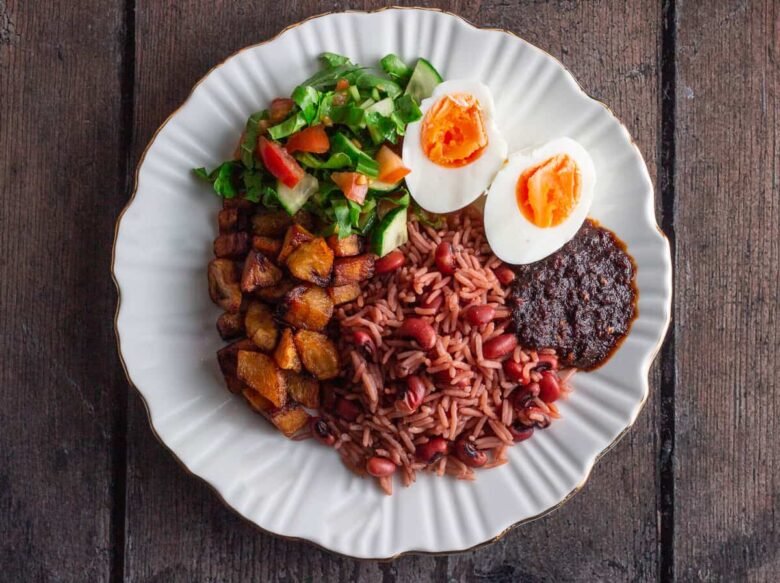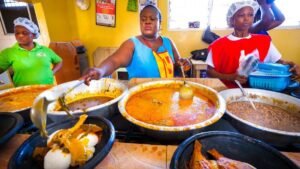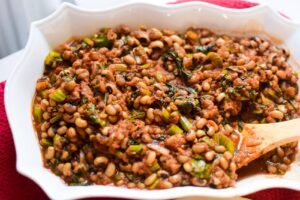Exploring Ghana is not just about its landscapes, beaches, and history—it’s also about immersing yourself in one of West Africa’s most flavorful and diverse culinary cultures. Whether you’re a foodie or simply curious, Ghana offers an exciting range of dishes, cooking styles, and dining traditions that can easily become highlights of your trip.
Here are the top food experiences every traveler should add to their Ghana itinerary, from street eats to market tours and traditional meals.
1. Eat Fufu with Your Hands in a Local Chop Bar
Why It’s Essential: Fufu is Ghana’s most iconic dish, made by pounding cassava and plantain (or yam) into a soft, stretchy dough served with rich soups.
Where to Try It:
- Esi’s Chop Bar in Kumasi
- Asanka Local or Bush Canteen in Accra
- Alhaji’s Chop Bar in Tamale for northern variations
Pair With:
- Light soup (goat or fish)
- Groundnut (peanut) soup
- Palm nut soup
Tip: Fufu is traditionally eaten with the right hand—no chewing, just swallow.
2. Visit a Morning Market for Waakye
Why You’ll Love It: Waakye is a beloved Ghanaian breakfast made of rice and beans, served with a variety of flavorful sides.
Must-Have Toppings:
- Gari (cassava flakes)
- Shito (black pepper sauce)
- Boiled eggs
- Wele (cow skin)
- Avocado and fried plantain
Best Spots:
- Aunty Muni Waakye in Cantonments (Accra)
- Madina Market in Accra
- Kejetia Market in Kumasi
Local Tip: Go early—many vendors sell out by 10 a.m.
3. Street Food Crawl in Accra or Kumasi
Why It’s Unforgettable: Ghana’s street food culture is vibrant, affordable, and absolutely delicious. Explore roadside stalls, night vendors, and street grills.
Top Picks:
- Kelewele (spicy fried plantains)
- Chinchinga (kebabs)
- Roasted corn and coconut
- Fried yam and turkey tails (chofi)
- Hausa Koko (spiced millet porridge) with bofrot (doughnuts)
Best Neighborhoods:
- Osu, Nima, and Circle in Accra
- Adum and Bantama in Kumasi
Safety Tip: Choose stalls with high foot traffic—locals know where the food is safest and best.
4. Try Banku and Grilled Tilapia by the Beach
The Experience: Grilled tilapia, spiced with ginger, garlic, and chili, served with fermented corn dough (banku) and fresh pepper sauce is a Ghanaian favorite—especially by the sea.
Where to Go:
- Labadi Beach and Kokrobite (Accra)
- Busua and Elmina beaches (Western Region)
Pair With: Chilled Star or Club beer, or fresh pineapple juice
Tip: Ask for the fish to be well-done if you prefer it crispy.
5. Enjoy a Seafood Feast in the Western Region
Why It’s Worth the Trip: Towns like Axim, Sekondi-Takoradi, and Cape Three Points offer fresh seafood prepared with traditional Fante techniques.
Try:
- Lobster in light soup
- Octopus grilled or stewed in palm oil
- Crab with fufu or kenkey
- Smoked fish stews with yam or rice
Recommended Spot: Lou Moon Resort (Axim), The Plot Restaurant (Takoradi)
6. Take a Ghanaian Cooking Class
Why It’s Valuable: A hands-on cooking class helps you understand the ingredients, techniques, and cultural meanings behind Ghanaian cuisine.
Learn To Make:
- Jollof rice from scratch
- Fufu with soup
- Kelewele and shito
- Akple and okro soup (Ewe cuisine)
Where to Book:
- Mukase Chic’s food experiences (Accra)
- Jollof and Beyond cooking classes (Accra or Cape Coast)
- Airbnb Experiences and local eco-lodges
Tip: Choose classes that include a market tour for the full experience.
7. Savor Northern Dishes in Tamale or Bolgatanga
Why It’s Unique: Northern Ghana has a distinct culinary identity influenced by Sahelian and Islamic traditions.
Try:
- Tuo Zaafi (TZ) with ayoyo soup
- Rice balls (omotuo) with groundnut soup
- Dawadawa-flavored stews
- Boiled guinea fowl with spicy pepper sauce
Best Places:
- Alhaji’s Chop Bar (Tamale)
- Street vendors and local kitchens in Bolgatanga
Tip: The spice levels can be high—ask for “small pepper” if needed.
8. Attend a Traditional Festival Feast
What to Expect: During Ghana’s many cultural festivals, communal feasting plays a central role. It’s a chance to taste rare or ceremonial dishes.
Festivals to Target:
- Akwasidae (Kumasi – every 6 weeks)
- Hogbetsotso (Anloga – November)
- Homowo (Accra – August/September)
- Damba Festival (Northern Region – September/October)
Feast Foods:
- Mpɔtɔmpɔtɔ (yam porridge)
- Kpokpoi (steamed cornmeal) with palm nut soup
- Roasted meats and local drinks
Tip: Festivals are public, but feasts may be private—make local connections to join.
9. Eat Jollof Rice from Different Regions
Why This Is a Must: Every Ghanaian region (and even every household) has its own jollof rice style. Comparing them is a delicious journey in itself.
Variations:
- Ashanti-style: Spicier, with more tomato depth
- Accra-style: Balanced with veggies and beef
- Coastal jollof: Often with seafood elements
Restaurants to Compare:
- Buka Restaurant (Accra)
- Green Pepper Chop Bar (Cape Coast)
- Street-side rice vendors in any town
Fun Idea: Start your own “Jollof Journal” and rate each version you try.
10. Pair Ghanaian Dishes with Local Drinks
Beverages to Explore:
- Sobolo: Hibiscus tea spiced with ginger and cloves
- Pito: Fermented millet beer (Northern Ghana)
- Palm wine: Naturally fermented from palm trees
- Atadwe milk: Sweet tiger nut drink
- Local beers: Club, Star, Origin, Guinness Smooth
Suggested Pairings:
- Fufu with palm nut soup + palm wine
- Jollof rice + Club beer
- Kelewele + chilled sobolo
Tip: Buy sobolo or atadwe milk from clean, labeled vendors—or make your own during a cooking class.
Sample Foodie Itinerary: 3 Days in Accra
| Time | Experience |
|---|---|
| Day 1 Morning | Waakye breakfast at Aunty Muni |
| Day 1 Lunch | Cooking class + market tour |
| Day 1 Evening | Rooftop dinner at Skybar25 with grilled tilapia |
| Day 2 Morning | Hausa Koko with bofrot on the street |
| Day 2 Lunch | Fufu at Bush Canteen |
| Day 2 Evening | Kelewele + beer at Osu Night Market |
| Day 3 Brunch | Jollof tasting at Buka Restaurant |
| Day 3 Afternoon | Sobolo and shopping at Art Centre |
Tips for Food Travelers in Ghana
- Eat Local, Eat Early: Popular dishes sell out by early afternoon.
- Bring Cash: Many small food joints don’t accept cards.
- Ask for “small pepper”: Ghanaian food can be spicy.
- Hydrate Well: Especially after eating hot soups in warm weather.
- Be Adventurous: Some of the best meals are the least expected.
Conclusion
Ghana’s food culture is as rich and diverse as its people. From the communal joy of eating fufu with your hands to the quiet delight of sipping sobolo by the beach, every meal tells a story. Whether you’re a first-time visitor or a seasoned traveler, adding these top food experiences to your itinerary will not only satisfy your appetite—but also connect you deeply to the heart of Ghana.
So go ahead—taste your way through the country.




